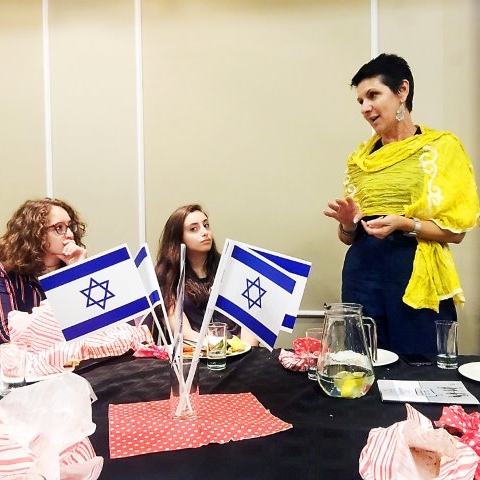
SA

World Zionist Organisation expert guides local youth debate
BETH AMATO
This is advice given by Gusti Yehoshua-Braverman, the head of department for Diaspora Activities at the World Zionist Organisation, who was in South Africa this week to work with Jewish youth movements to foster dialogue about issues relating to Zionism in the 21st century.
She explains that the youth today – the millennial generation – are a tough nut to crack. They seek meaning in their lives and want to know “What can Israel do for me?” rather than vice versa.
Some view this as being spoilt and entitled, but Yehoshua-Braverman has a knack for engaging with millennials and sees past that. “They want to be heard and debated with,” she says. “They want the conversation to be open-ended and don’t want to be preached to.”
It’s for this reason that she insists the gatherings she holds, are about dialogue and that controversial subjects should not be forbidden, but rather tackled and spoken about.
“There is nothing taboo. There is no right answer to any of the questions we ask. This is what the millennials appreciate.
“Youth in the Diaspora often view Israel as their safe haven, should problems arise in their country, but they struggle to articulate what else Israel means to them and why it’s important to them,” said Yehoshua-Braverman.
“It’s easy being a Jew, but it’s not easy to be pro-Israel. In my travels to France, Chile, Lithuania, Colombia and the like, this is what comes up strongly.”
In fact, she says, many youth recall being ashamed of being Jewish because of the obvious link to Israel. “Many of the youth in the Diaspora are embarrassed by Israel’s actions and policies and don’t want to admit to others in their home countries that they are Jewish. It’s very disconcerting,” says Yehoshua-Braverman.
Recently when she was in Australia a student said he never tells people he’s Jewish because he gets “boxed”. There is no way, he told her, that he would even mention he was pro-Israel. He was afraid of being bullied.
The conflicted relationship with Israel and the tenuous connection to the Jewish homeland, is a thread that she feels runs through all of the youth Diaspora communities. The programme she runs through the World Zionist Organisation, Beit Ha’am, has the intention of showing how Zionism as a philosophy and way of life, is above conflict and the limits of the state and must endure for the Jewish people to have a real sense of continuity.
Israel, she says has much to offer.” Our programme highlights its rich variety of art, delectable cuisine, literature and good music.”
Yehoshua-Braverman has a tough task: that of ensuring the young Jewish millennials find meaning in their relationship to Israel so that there is a lasting affinity with the country. “If we lose this generation and it’s simple – we won’t receive any donations.”
However, Yehoshua-Braverman is at peace with the slow progress of changing negative attitudes and beliefs about Israel. She knows that she can’t be too gung-ho because Jewish identity is deeply complex for many youth in the Diaspora.
She is in office until 2020 and hopes to help realise Theodor Herzl’s initial wish for Israel, contained in the Declaration of the Establishment of the State of Israel: “After being forcibly exiled from their land, the people kept faith with it throughout their dispersion and never ceased to pray and hope for their return to it and for the restoration of their political freedom.”




